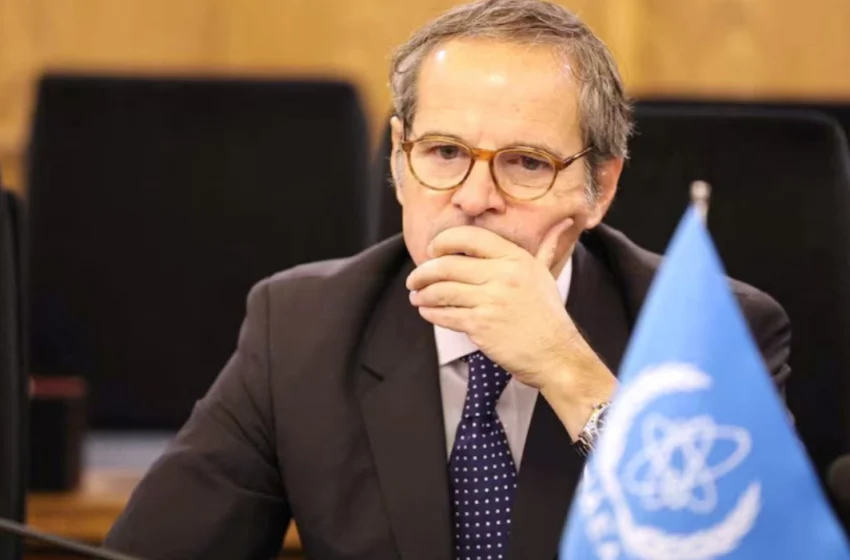
UN nuclear watchdog pushes for deal before Iran crosses threshold
Negotiations between Iran and the United States regarding Tehran’s rapidly developing nuclear program are “in a very crucial” phase, the director of the United Nations nuclear watchdog agency said during a trip to the Islamic Republic.
Remarks from International Atomic Energy Agency Director Rafael Mariano Grossi in Tehran included recognition that his organization likely would be instrumental in certifying Iranian compliance should a negotiation reach an agreement. Iran and the United States are to gather Saturday in Rome for a fresh round of discussions following last weekend’s inaugural meeting in Oman.
Grossi’s visit coincided with Prince Khalid bin Salman, Saudi Arabia’s defense minister, traveling to Tehran. He is the highest-ranking official from the kingdom to visit Iran since the Chinese-mediated détente in 2023. This visit occurs as Saudi Arabia seeks to conclude its decade-long conflict with the Iranian-supported Houthi rebels in Yemen, despite a new wave of intense U.S. airstrikes targeting them.
The price of Saturday’s negotiations and broader Mideast geopolitical tensions couldn’t be more elevated, as the Israel-Hamas conflict escalates in the Gaza Strip. U.S. President Donald Trump has consistently warned repeatedly of raining down airstrikes to destroy Iran’s nuclear facilities unless a agreement is reached. Iranian leaders more urgently threaten that they might develop a nuclear weapon out of their current inventory of near weapons-grade-level enriched uranium.
I don’t have to do it in a hurry because I believe that Iran can have a wonderful country and live happily without death — and I’d like to see that, that’s my first choice,” Trump replied when questioned about an attack while hosting Italian Prime Minister Giorgia Meloni in the Oval Office.
Grossi visits during critical Iran-US talks
Grossi traveled to Iran and sat down with Iranian Foreign Minister Abbas Araghchi, who is currently in Moscow for independent negotiations presumably on the talks. Grossi on Thursday met with Mohammad Eslami, the director of the Atomic Energy Organization of Iran, then later visited a hall that had some of Iran’s civilian nuclear projects on display.
We are aware that we are in a very delicate, I would say, phase of this significant negotiation, so I want to focus on the positive,” Grossi said to Iranian media. “There is a chance for a good result. Nothing is certain. We must ensure that we put all the pieces in place. in order to reach this agreement.
He added: “We realize we don’t have much time. So this is why I’m here. This is why I’m in touch with the United States too.” When queried regarding Trump’s threats to target Iran, Grossi asked the people to “focus on our goal.
“Once we arrive at our goal, all these things will vanish because there will be no need for worry,” he asserted.
For his part, Eslami told Iran expected the IAEA to “act professionally and remain impartial,” the state-run IRNA news agency reported. Since the collapse of the nuclear agreement in 2018 with Trump’s unilateral pullout of the U.S. from the accord, Iran has shed all constraints on its program and enriches uranium to as high as 60% purity — close to weapons-grade levels of 90%.
IAEA-installed surveillance cameras have been jammed, and Iran has excluded some of the agency’s most skilled inspectors from coming to Tehran. Iranian leaders also increasingly threatened they would seek atomic weapons, something the West and IAEA feared for years as Tehran gave up an structured weapons program in 2003.
Even with tensions between Iran and the agency, its access has not been completely cut off. But Grossi admitted in a French newspaper interview that “Iran has enough material to build not one but several bombs.”
It’s like a jigsaw; they have the pieces and one day they might be able to fit them together,” he said to Le Monde. “There is still a long way to go before that happens. But they are not far off, admittedly.
U.N. spokesperson Stephane Dujarric referred to this weekend’s Iran-U.S. talks as “a good sign.” “We very much hope that the discussions between the United States and the Islamic Republic of Iran will produce a positive result which will result in the easing of tensions in the Gulf, in the Middle East and between the two nations,” he added.


